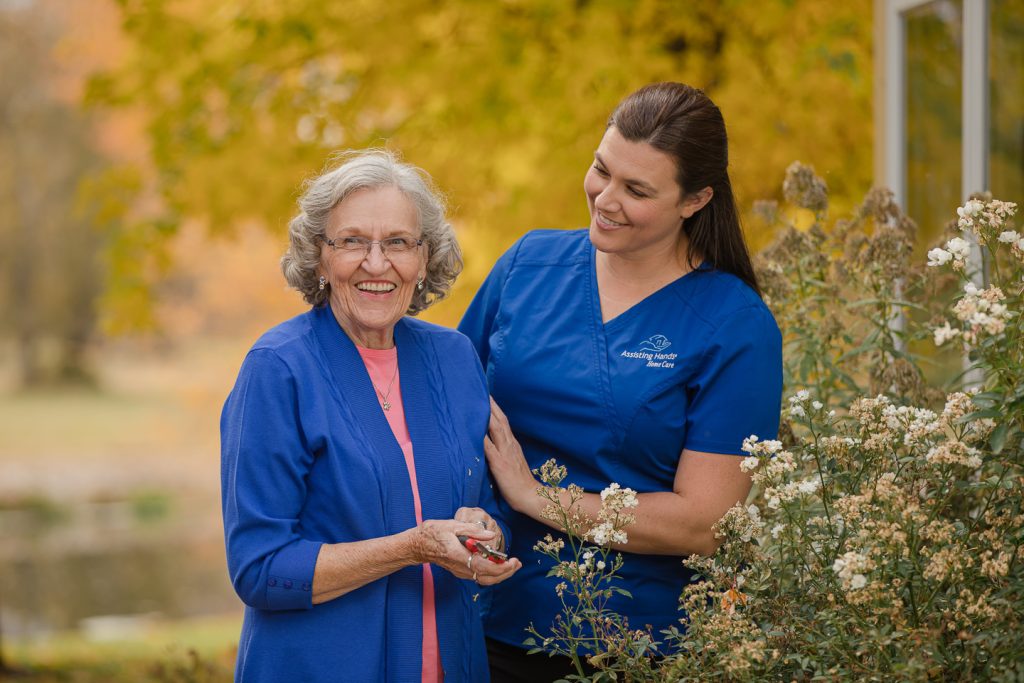

Seniors commonly need some form of care and assistance as they reach their golden years. This results in some seniors moving into assisted living facilities, but they are increasingly choosing to remain at home to age. This option lets seniors maintain some independence and remain in the comfortable and familiar environment of their home, but they will still need help at home.
Certain elderly individuals are fortunate enough to find sufficient help from a loved one, but not all seniors have that privilege. In such a situation, elderly individuals can still receive the care they require from a professional caregiver.
Professional caregivers can be hired privately or through a home care agency. At an agency, caregivers can provide help through the numerous in-home care services available. From standard senior care to memory care, caregivers will help seniors lead a safe and healthy life.
The type and amount of care an elderly individual receives will depend on their own specific care needs. Some seniors will only need minimal help on a part-time basis while other seniors will need full-time care. No matter the level of assistance needed, elderly individuals will often require help with activities of daily living, which caregivers are equipped and trained to provide.
If you are considering hiring a caregiver to assist your elderly loved one, then continue reading to learn more about activities of daily living and how a caregiver can help with them.
What are Activities of Daily Living?
As the name suggests, activities of daily living (ADLs) are essential personal tasks that people do on an everyday basis. These skills allow people to properly care for themselves so they can lead a healthy life. Some examples of ADLs include bathing and showering, toileting, getting dressed, and eating.
When people cannot perform ADLs on their own, they are unable to take care of themselves.
What are Instrumental Activities of Daily Living?
Similar to ADLs, instrumental activities of daily living (IADLs) are tasks people do on an everyday basis. However, IADLs differ from ADLs in that IADLs regard one’s ability to function in a society and a community. Some examples of IADLs include meal preparation, shopping for groceries and other essentials, and doing housework.
Why are Activities of Daily Living Important?
Both ADLs and IADLs are important in ensuring that people can successfully live an independent life. For older adults, these can be used to assess their ability to function. Any struggles with either can also help identify potential problems with their physical and mental health.
For example, seniors with Alzheimer’s disease or another form of dementia typically require help with ADLs because of their declining condition.
How Do Caregivers Help with Activities of Daily Living?
Seniors are not always as receptive to receiving help or care even when they need it. This can especially be the case if elderly individuals have dementia, which can cause them to become agitated. Knowing this, caregivers maintain open communication with the client regarding care.
Asking a senior about their preferences and comfort levels and voicing how help is provided can be helpful in getting seniors to be accepting of their care. Using a calm tone and confident demeanor is also beneficial.
Caregivers will provide seniors with help as needed. So if a senior needs help when bathing and/or showering, a caregiver can help. How that help is provided is based on the senior’s preferences and abilities. They can simply monitor the activity to ensure the client is safe, watching to make sure the elderly individual does not slip and fall. Alternatively, the caregiver can provide direct assistance if necessary, helping to clean the person.
This also goes for other ADLs like toileting, personal care tasks, dressing, and transfer assistance.
Furthermore, caregivers understand that seniors want to maintain independence and freedom where they can. As such, caregivers will not provide unnecessary help simply because they can. For example, seniors may need help with bathing but have no issues with feeding themselves. In such a case, caregivers can provide bathing assistance but will not overstep by trying to help with feeding.

Senior Care Services from Assisting Hands Home Care
If you have an elderly relative who could use help with activities of daily living, then consider hiring a caregiver to ensure your loved one has the care they need to continue living at home in a safe manner.
Assisting Hands Home Care provides in-home care services to help seniors with the care and assistance they need. We will assign your elderly relative with a properly trained and licensed caregiver who will provide effective and compassionate care as needed.
When you inquire about our senior care services, we start by conducting an in-home consultation during which we will learn of your loved one’s care needs. Using this information, we are then able to create a customized care plan that properly caters to their specific needs. Our caregivers will help with ADLs, such as restroom use and transfer assistance, as well as IADLs, including transportation and errands.
With assistance from our in-home care services, your elderly loved one will have the help they need to be safe and healthy at home.
